古希腊哲学(英文)
- 格式:ppt
- 大小:5.07 MB
- 文档页数:1

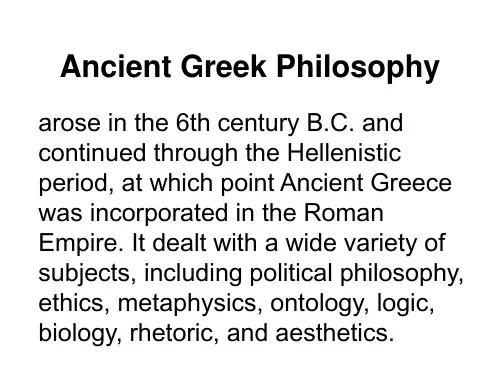
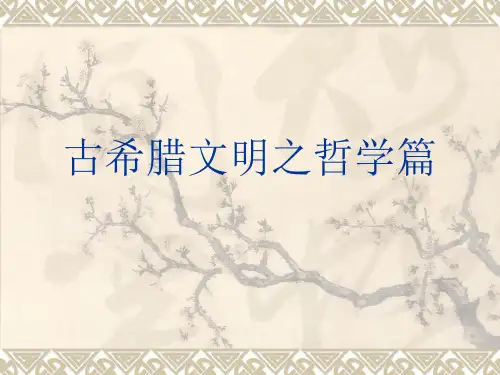
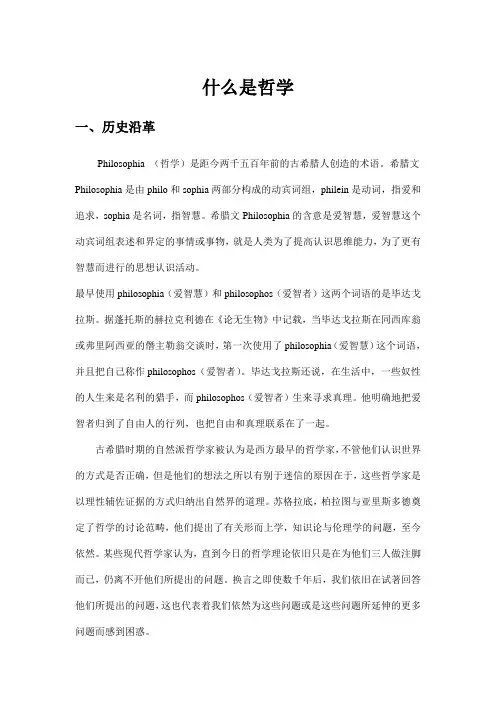
什么是哲学一、历史沿革Philosophia (哲学)是距今两千五百年前的古希腊人创造的术语。
希腊文Philosophia是由philo和sophia两部分构成的动宾词组,philein是动词,指爱和追求,sophia是名词,指智慧。
希腊文Philosophia的含意是爱智慧,爱智慧这个动宾词组表述和界定的事情或事物,就是人类为了提高认识思维能力,为了更有智慧而进行的思想认识活动。
最早使用philosophia(爱智慧)和philosophos(爱智者)这两个词语的是毕达戈拉斯。
据蓬托斯的赫拉克利德在《论无生物》中记载,当毕达戈拉斯在同西库翁或弗里阿西亚的僭主勒翁交谈时,第一次使用了philosophia(爱智慧)这个词语,并且把自己称作philosophos(爱智者)。
毕达戈拉斯还说,在生活中,一些奴性的人生来是名利的猎手,而philosophos(爱智者)生来寻求真理。
他明确地把爱智者归到了自由人的行列,也把自由和真理联系在了一起。
古希腊时期的自然派哲学家被认为是西方最早的哲学家,不管他们认识世界的方式是否正确,但是他们的想法之所以有别于迷信的原因在于,这些哲学家是以理性辅佐证据的方式归纳出自然界的道理。
苏格拉底,柏拉图与亚里斯多德奠定了哲学的讨论范畴,他们提出了有关形而上学,知识论与伦理学的问题,至今依然。
某些现代哲学家认为,直到今日的哲学理论依旧只是在为他们三人做注脚而已,仍离不开他们所提出的问题。
换言之即使数千年后,我们依旧在试著回答他们所提出的问题,这也代表着我们依然为这些问题或是这些问题所延伸的更多问题而感到困惑。
“哲”一词在中国起源很早,历史久远。
如“孔门十哲”,“古圣先哲”等词,“哲”或“哲人”,专指那些善于思辨,学问精深者,即西方近似“哲学家”,“思想家”之谓。
一般认为中国哲学起源东周时期,以孔子的儒家、老子的道家、墨子的墨家及晚期的法家为代表。
而实际上在之前的《易经》当中,已经开始讨论哲学问题。
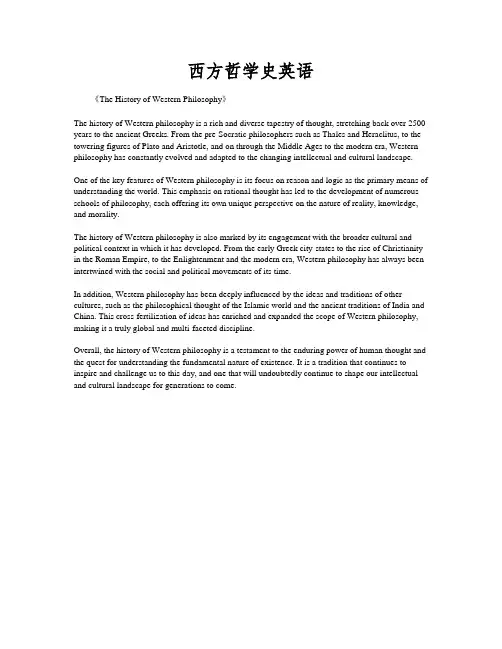
西方哲学史英语《The History of Western Philosophy》The history of Western philosophy is a rich and diverse tapestry of thought, stretching back over 2500 years to the ancient Greeks. From the pre-Socratic philosophers such as Thales and Heraclitus, to the towering figures of Plato and Aristotle, and on through the Middle Ages to the modern era, Western philosophy has constantly evolved and adapted to the changing intellectual and cultural landscape.One of the key features of Western philosophy is its focus on reason and logic as the primary means of understanding the world. This emphasis on rational thought has led to the development of numerous schools of philosophy, each offering its own unique perspective on the nature of reality, knowledge, and morality.The history of Western philosophy is also marked by its engagement with the broader cultural and political context in which it has developed. From the early Greek city-states to the rise of Christianity in the Roman Empire, to the Enlightenment and the modern era, Western philosophy has always been intertwined with the social and political movements of its time.In addition, Western philosophy has been deeply influenced by the ideas and traditions of other cultures, such as the philosophical thought of the Islamic world and the ancient traditions of India and China. This cross-fertilization of ideas has enriched and expanded the scope of Western philosophy, making it a truly global and multi-faceted discipline.Overall, the history of Western philosophy is a testament to the enduring power of human thought and the quest for understanding the fundamental nature of existence. It is a tradition that continues to inspire and challenge us to this day, and one that will undoubtedly continue to shape our intellectual and cultural landscape for generations to come.。

西方哲学史名词解释西方哲学史是指西方文化圈内哲学思想的发展历史。
以下是对西方哲学史中一些重要名词的解释:1. 柏拉图(Plato):古希腊哲学家,为苏格拉底的学生,他的主要思想被记录在对话体的著作《柏拉图全集》中。
柏拉图强调理念的存在和重要性,认为理念是超越感官世界的真实存在。
2. 亚里士多德(Aristotle):古希腊哲学家,为柏拉图的学生,他的主要思想被记录在《形而上学》、《政治学》等著作中。
亚里士多德提出了逻辑学的基本原理,并强调通过观察和实证研究来获得知识。
3. 康德(Immanuel Kant):18世纪德国哲学家,他的主要思想被记录在《纯粹理性批判》、《实践理性批判》等作品中。
康德提出了“先验”的理念,认为我们的认识能力受到某些固定的先验结构的限制。
4. 辩证法(Dialectic):哲学上的概念,指的是通过对比和对立来促进思考和理解的过程。
辩证法起源于古希腊哲学,并在马克思主义哲学中得到广泛应用。
5. 实用主义(Pragmatism):19世纪末20世纪初美国哲学派别,其代表人物包括皮尔士(Charles Peirce)、杜威(John Dewey)等。
实用主义强调对知识进行实用和经验性的评估,并强调知识应该与行动和实践相结合。
6. 身心二元论(Cartesian Dualism):文艺复兴时期哲学家笛卡尔(René Descartes)提出的观点,认为心灵和身体是两种不同的实体。
身心二元论影响了后来的哲学和心理学发展,并成为关于心灵和身体关系的重要议题。
7. 马克思主义(Marxism):以卡尔·马克思(Karl Marx)和弗里德里希·恩格斯(Friedrich Engels)为代表的思想体系。
这一思想体系基于对资本主义社会的批判,认为社会和历史的发展是由阶级斗争驱动的。
以上是对西方哲学史中一些重要名词的简要解释。
在学习西方哲学史时,了解这些名词的含义能够帮助我们更好地理解西方哲学思想的发展和演变。
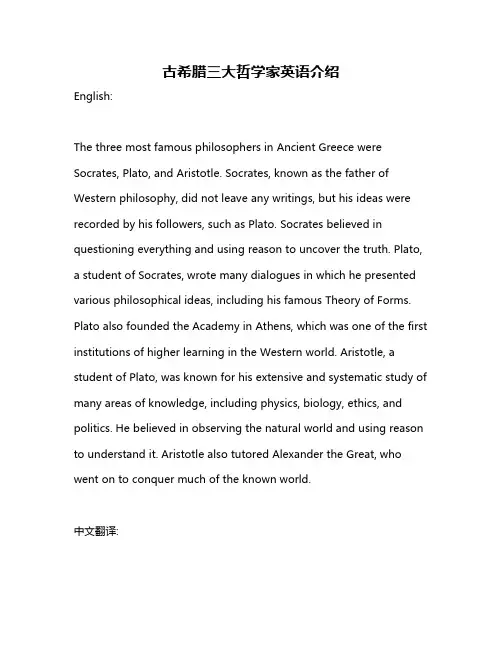
古希腊三大哲学家英语介绍English:The three most famous philosophers in Ancient Greece were Socrates, Plato, and Aristotle. Socrates, known as the father of Western philosophy, did not leave any writings, but his ideas were recorded by his followers, such as Plato. Socrates believed in questioning everything and using reason to uncover the truth. Plato, a student of Socrates, wrote many dialogues in which he presented various philosophical ideas, including his famous Theory of Forms. Plato also founded the Academy in Athens, which was one of the first institutions of higher learning in the Western world. Aristotle, a student of Plato, was known for his extensive and systematic study of many areas of knowledge, including physics, biology, ethics, and politics. He believed in observing the natural world and using reason to understand it. Aristotle also tutored Alexander the Great, who went on to conquer much of the known world.中文翻译:古希腊最著名的三位哲学家是苏格拉底、柏拉图和亚里士多德。

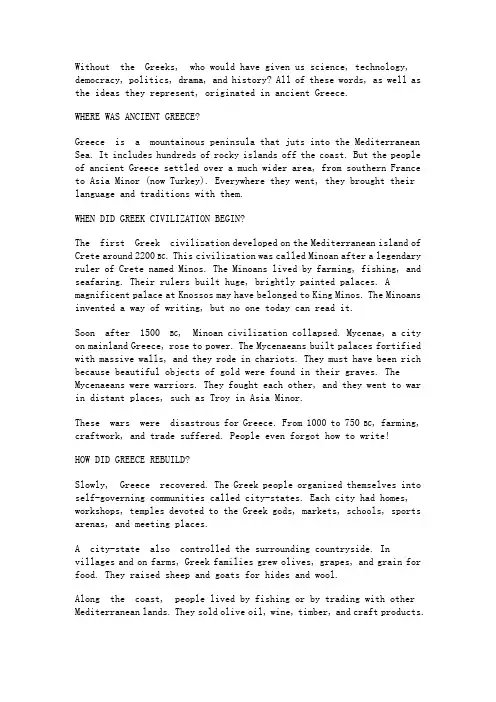
Without the Greeks, who would have given us science, technology, democracy, politics, drama, and history? All of these words, as well as the ideas they represent, originated in ancient Greece.WHERE WAS ANCIENT GREECE?Greece is a mountainous peninsula that juts into the Mediterranean Sea. It includes hundreds of rocky islands off the coast. But the people of ancient Greece settled over a much wider area, from southern France to Asia Minor (now Turkey). Everywhere they went, they brought their language and traditions with them.WHEN DID GREEK CIVILIZATION BEGIN?The first Greek civilization developed on the Mediterranean island of Crete around 2200 BC. This civilization was called Minoan after a legendary ruler of Crete named Minos. The Minoans lived by farming, fishing, and seafaring. Their rulers built huge, brightly painted palaces. A magnificent palace at Knossos may have belonged to King Minos. The Minoans invented a way of writing, but no one today can read it.Soon after 1500 BC, Minoan civilization collapsed. Mycenae, a city on mainland Greece, rose to power. The Mycenaeans built palaces fortified with massive walls, and they rode in chariots. They must have been rich because beautiful objects of gold were found in their graves. The Mycenaeans were warriors. They fought each other, and they went to war in distant places, such as Troy in Asia Minor.These wars were disastrous for Greece. From 1000 to 750 BC, farming, craftwork, and trade suffered. People even forgot how to write!HOW DID GREECE REBUILD?Slowly, Greece recovered. The Greek people organized themselves into self-governing communities called city-states. Each city had homes, workshops, temples devoted to the Greek gods, markets, schools, sports arenas, and meeting places.A city-state also controlled the surrounding countryside. In villages and on farms, Greek families grew olives, grapes, and grain for food. They raised sheep and goats for hides and wool.Along the coast, people lived by fishing or by trading with other Mediterranean lands. They sold olive oil, wine, timber, and craft products.The Greeks were especially known for their excellent metalwork and painted pottery.The Greeks liked debating, questioning, and exploring new ideas. They admired logical arguments and scientific proof. They believed in justice and human dignity. But they were not all equal. Some Greeks were born free. Others were slaves with no rights. Greek men had freedom to work, study, and travel. Women spent their lives at home. They wove cloth, bore children, and cared for their families.The Greeks also believed in gods who controlled human lives. They honored the gods and made offerings to them. In return, they hoped for blessings. To please the gods, city-states held religious festivals, with competitions in music, dance, drama, poetry, and sports. The Olympic Games began as a religious festival of this kind, probably in 776 BC.WHICH WAS THE STRONGEST CITY-STATE?By around 500 BC, two city-states were supreme. Sparta was famous for its fearsome fighting men. It had a powerful ruling council, secret police, and spies. All its citizens—including women and children—were trained to be tough and brave. Slaves grew food.Athens was a democracy. All adult male citizens had the right to elect leaders, serve on juries, and debate government plans. Athenians prized learning and the arts. They asked the best artists, architects, philosophers, and writers to live and work in their city. From 480 to 359 BC, Athens collected tribute(payments) from smaller, weaker Greek cities. It used this money, and wealth from its silver mines, to buy warships. It also rebuilt the center of the city in magnificent style, with temples, statues, law courts, theaters, and strong walls.From 490 to 479 BC, Athens and Sparta fought together against invaders from Persia. But then they became rivals. From 431 to 404 BC, they fought each other in a bitter war. The war severely weakened both powers.HOW DID GREEK POWER END?In 338 BC, Greece was conquered by Macedonia, a kingdom to the north. City-states lost their political power, but Greek civilization continued and spread to many distant lands. Under Macedonian rule, Greek philosophers, mathematicians, and scientists made discoveries that are still useful today.In 146 BC, Roman armies invaded Greece. Roman leaders admired Greek achievements, and so Greek ideas and artistic styles spread still further, through the lands of the Roman Empire. In AD 395, Greece became part of the Byzantine Empire. It was ruled from the city of Constantinople (now Istanbul, Turkey). Greek language, knowledge, and technology remained important until the Byzantine Empire fell to Ottoman Turks in 1453.THE INFLUENCE OF ANCIENT GREECEToday, Greek civilization still shapes the way people think, speak, study, govern, design buildings, and spend their leisure time. Many words in the English language come from Greek roots. Questions raised by Greek philosophers are still debated. Greek plays are read and performed. The Olympic Games are held every four years, just as in ancient Greece. Many of our buildings—especially those with tall, round columns—are modeled after Greek buildings. The influence of ancient Greece is felt throughout Europe and in all the lands that European nations once ruled.。
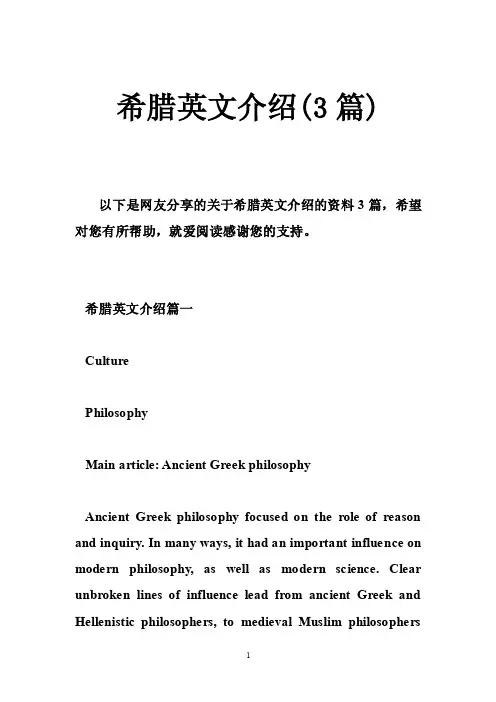
希腊英文介绍(3篇)以下是网友分享的关于希腊英文介绍的资料3篇,希望对您有所帮助,就爱阅读感谢您的支持。
希腊英文介绍篇一CulturePhilosophyMain article: Ancient Greek philosophyAncient Greek philosophy focused on the role of reason and inquiry. In many ways, it had an important influence on modern philosophy, as well as modern science. Clear unbroken lines of influence lead from ancient Greek and Hellenistic philosophers, to medieval Muslim philosophersand Islamic scientists, to the European Renaissance and Enlightenment, to the secular sciences of the modern day.Neither reason nor inquiry began with the Greeks. Defining the difference between the Greek quest for knowledge and the quests of the elder civilizations, such as the ancient Egyptians and Babylonians, has long been a topic of study by theorists of civilization.LiteratureMain articles: Ancient Greek literature, Greek tragedy, Greek comedy, and Theatre of ancient GreeceAncient Greek society placed considerable emphasis upon literature. Many authors consider the western literary tradition to have begun with the epic poems The Iliad and The Odyssey, which remain giants in the literary canon fortheir skillful and vivid depictions of war and peace, honor and disgrace, love and hatred. Notable among later Greek poets was Sappho, who defined, in many ways, lyric poetry as a genre.A playwright named Aeschylus changed Western literature forever when he introduced the ideas of dialogue and interacting characters to playwriting. In doing so, he essentially in vented ―drama‖: his Oresteia trilogy of plays is seen as his crowning achievement. Other refiners of playwriting were Sophocles and Euripides. Sophocles is credited with skillfully developing irony as a literary technique, most famously in his play Oedipus the King. Euripedes, conversely, used plays to challenge societal norms and mores—a hallmark of much of Western literature for the next 2,300 years and beyond—and his works such as Medea, The Bacchae and The Trojan Women are still notable for their ability to challenge our perceptions of propriety, gender, and war. Aristophanes, a comic playwright, defines and shapes the idea of comedy almost asAeschylus had shaped tragedy as an art form—Aristophanes’ most famous plays include the Lysistrata and The Frogs.Philosophy entered literature in the dialogues of Plato, who converted the give and take of Socratic questioning into written form. Aristotle, Plato’s student, wrote dozens of works on many scientific disciplines, but his greatest contribution to literature was likely his Poetics, which lays out his understanding of drama, and thereby establishes the first criteria for literary criticism.Science & T echnologyMain articles: List of Graeco-Roman geographers, Greek astronomy, Greek mathematics, Medicine in ancient Greece, and Ancient Greek technologyAncient Greece mathematics contributed many important developments to the field of mathematics, including the basic rules of geometry, the idea of formal mathematical proof, and discoveries in number theory, mathematical analysis, applied mathematics, and approached close to establishing the integral calculus. The discoveries of several Greek mathematicians, including Pythagoras, Euclid, and Archimedes, are still used in mathematical teaching today.The Greeks developed astronomy, which they treated as a branch of mathematics, to a highly sophisticated level. The first geometrical, three-dimensional models to explain the apparent motion of the planets were developed in the 4th century BC by Eudoxus of Cnidus and Callippus of Cyzicus. Their younger contemporary Heraclides Ponticus proposed that the Earth rotates around its axis. In the 3rd century BC Aristarchus of Samos was the first to suggest a heliocentric system, although only fragmentary descriptions of his idea survive.[18] Eratosthenes, using the angles of shadowscreated at widely-separated regions, estimated the circumference of the Earth with great accuracy.[19] In the 2nd century BC Hipparchus of Nicea made a number of contributions, including the first measurement of precession and the compilation of the first star catalog in which he proposed the modern system of apparent magnitudes.The Antikythera mechanism, a device for calculating the movements of planets, dates from about 80 B.C., and was the first ancestor of the astronomical computer. It was discovered in an ancient shipwreck off the Greek island of Antikythera, between Kythera and Crete. The device became famous for its use of a differential gear, previously believed to have been invented in the 16th century, and the miniaturization and complexity of its parts, comparable to a clock made in the 18th century. The original mechanism is displayed in the Bronze collection of the National Archaeological Museum of Athens, accompanied by a replica.The ancient Greeks also made important discoveries in the medical field. Hippocrates was a physician of the Classical period, and is considered one of the most outstanding figures in the history of medicine. He is ref erred to as the ―father of medicine‖[20][21][22] in recognition of his lasting contributions to the field as the founder of the Hippocratic school of medicine. This intellectual school revolutionized medicine in ancient Greece, establishing it as a discipline distinct from other fields that it had traditionally been associated with (notably theurgy and philosophy), thus making medicine a profession.[23][24]Art & ArchitectureMain articles: Art in ancient Greece and Architecture of ancient GreeceThe art of ancient Greece has exercised an enormousinfluence on the culture of many countries from ancient times until the present, particularly in the areas of sculpture and architecture. In the West, the art of the Roman Empire was largely derived from Greek models. In the East, Alexander the Great’s conquests initiated several centuries of exchange between Greek, Central Asian and Indian cultures, resulting in Greco-Buddhist art, with ramifications as far as Japan. Following the Renaissance in Europe, the humanist aesthetic and the high technical standards of Greek art inspired generations of European artists. Well into the 19th century, the classical tradition derived from Greece dominated the art of the western world.Religion & MythologyMain articles: Ancient Greek religion, Hellenistic religion, and Greek mythologyGreek mythology consists of stories belonging to theancient Greeks concerning their gods and heroes, the nature of the world and the origins and significance of their religious practices. The main Greek gods were the twelve Olympians, Zeus, his wife Hera, Poseidon, Ares, Hermes, Hephaestus, Aphrodite, Athena, Apollo, Artemis, Demeter, and Hades. Other important deities included Hebe, Helios, Dionysus, Persephone and Heracles (a demi-god). Zeus’ parents were Kronos and Rhea who also were the parents of Poseidon, Hades, Hera, Hestia, and Demeter.希腊英文介绍篇二Sappho .The Alexandrians included her in the list of nine lyric poets. Her birth was sometime between 630 and 612 BCE, and it is said that she died around 570 BCE, but little is known for certain about her life. The bulk of her poetry, which was well-known and greatly admired through much of antiquity, has been lost, but her immense reputation hasendured through surviving fragments. Sappho’s lifetime witnessed a period of political turbulence on Lesbos and saw the rise of Pittacus. According to the Parian Marble, Sappho was exiled to Sicily sometime between 604 BCE and 594 BCE and Cicero records that a statue of her stood in the town-hall of Syracuse. Unlike the works of her fellow poet, Alcaeus, Sappho’s surviving poetry has very few allusions to political conditions. The principal exception is Fragment 98, which mentions exile and indicates that Sappho was lacking some of her customary luxuries. Her political sympathies may have lain with the party of Alcaeus. Though there is no explicit record of this, it is usually assumed that Sappho returned from exile at some point and that she spent most of her life in Lesbos.David Campbell has briefly summarized some of the most arresting qualities of Sappho’s poetry Clarity of language and simplicity of thought are everywhere evident in our fragments; wit and rhetoric, so common in English love-poetry and not quite absent from Catullus’ love poems, arenowhere to be found. Her images are sharp —the sparrows that draw Aphrodite’s chariot, the full moon in a starry sky,the solitary red apple at the tree-top—and she sometimes lingers over them to elaborate them for their own sake. She quotes the direct words of conversations real or imaginary and so gains immediacy. When the subject is the turbulence of her emotions, she displays a cool control in their expression. Above all, her words are chosen for their sheer melody: the skill with which she placed her vowels and consonants, admired by Dionysius of Halicarnassus, is evidenced by almost any stanza; the music to which she sang them has gone, but the spoken sounds may still enchant. Out of over 200 remaining remnants of Sappho’s poetry, Fragment 16 and Fragment 44 in particular are considered lyric retellingsof Homer epics, as Sappho was known to be very familiar with Homer’s poems. Both fragments make direct allusions to scenes in Homer’s Iliad , while Sappho also expands them with her own narrative illustrations. Fragment 16, for instance, serves to characterise Helen, a key figure of Homer’s, while Fragment 44 glorifies domestic joy by depicting the events leading to the wedding of Hector and Andromache.The politi cal atmosphere of the Lesbos during Sappho’stime paralleled that of Homer’s Troy, as the cities of Lesbos were constantly plagued with threats from Lydia. Whereas Homer focused depicting beauty through the glory of militarism, however, Sappho focused primarily onthe portrayal of beauty through love. As oratory poets, both Homer and Sappho used their work to celebrate and memorialise events for posterity. The exigency of their verses was therefore to preserve information as well as to entertain.希腊英文介绍篇三DramaOrigin: perform plays at religious festivals.Develop: in the 5th century B.C. a powerful drama developedStates: open-air theatres, audience sat on stone benches and looked down at the stage from three sides, actors wore masksTragedyAeschylus (525 — 456 B.C.)Works: Prometheus Bound, Persians, and Agamemnon Inthese plays there are only two actors and a chorus. Yet they manage to stir and move the audience deeply by showing heroes and heroines in complicated human situations, out of which there is no escape but death. The play are written in verse. Aeschylus is noted for his vivid character portrayal and majestic poetry ComedyAristophanes (about 450 --- 380 B.C.) Works: Frogs, Clouds, Wasps and Birds These plays are loose in plot and satirical in tone.HistoryHerodotus希罗多德(484 --- 430 B.C.) ―Father of History, he wrote about the wars between Greeks and Persians. His history, full of anecdotes and digressions and lively dialogue, is wonderfully readable. He kept alive many traditional stories, which were not always accurate. His object in writing was ―that the great and wonderful deeds done by Greeks and Persians should not lack renown.Homer ( probably lived around 700 B.C.)Two epics: LliadOdysseusThey are about great men and wars of a remoter age,probably in the period 1200—1100B.CPhilosophy and ScienceThe ancient Greeks were curious about many things, including what made the universe. They had the spirit of free enquiry and were quite ready to drop established ideas, to speculate, to use their imagination and to form their own conclusions. They were also not afraid to speak their minds. Pythagoras 毕达哥拉斯(about 580 --- 500 B.C.) had the idea that all things were number. Heracleitue 赫拉克利特(about 540 --- 480 B.C.) believed fire to be the primary element of the universe He also said: You cannot step twice into the same river. The sun is new everyday Democritus 德谟克利特(about 460 --- 370 B.C.) speculated about the atomic structure of matter. He was one of the earliest exponents of the atomic theory.Socrates苏格拉底( about 470 --- 399 B.C.)The dialectical method --- method of argument, by questions and answers. Greek philosopher who initiated a question-and-answer method of teaching as a means ofachieving self-knowledge. His theories of virtue and justice have survived through the writings of Plato, his most important pupil. Socrates was tried for corrupting the minds of Athenian youth and subsequently put to death (399).Plato 柏拉图( about 428 ---348 B.C.)Men have knowledge because of the existence of certain general ―idea‖, like beauty, truth, goodness. Only these ―ideas‖ are completely real, while the physical world is only relatively real. For this reason, Plato‘s philosophy is called Idealism.(唯心主义) Greek philosopher. A follower of Socrates, he founded the Academy (386), where he taught and wrote for much of the rest of his life. Plato presented his ideas in the form of dramatic dialogues, as in The Republic. Aristotle 亚里士多德Greek philosopher. A pupil of Plato, the tutor of Alexander the Great, and the author of works on logic, metaphysics, ethics, natural sciences, politics, and poetics, he profoundly influenced Western thought. In his philosophical system theory follows empirical observation and logic, based on the syllogism三段论, is the essential method of rational inquiry.ScienceEuclid 欧几里得(约公元前3世纪的古希腊数学家) is even now well-known for his Element《几何原本》, a textbook of geometry, perhaps the most successful textbook ever written, because it was in use in English schools until the early years of the 20th century.Archimedes 阿基米德(287—212 B.C.) did important work not only in geometry, but also in arithmetic, machanics, and hydrostatics. ―Give me a place to stand, and I will move the world.‖ Greek science did not neglect ap plication. Mathematics, the purest of sciences, was applied in at least five fields: acoustics, optics, geography, statics and astronomy. Greek scientists collected a wealth of material and enquired into the proper method of doing scientific work. As a result, they were able to deduce theories and built up systems, which had a tremendous influence on later scientists.Greek MythologyGreek Mythology is a group of traditional tales told by the ancient Greeks about the deeds of gods, heroes and theirrelations with human beings.Its great influence upon the English language and literature is beyond description. A great number of words and idioms in the English language come from the Greek mythology.Godsthe old theogony : the Tians(旧神谱:奥林匹斯十二泰坦)the new theogony : the Gods (新神谱奥林匹斯十二主神)Heros——Perseus (珀尔修斯) Jason (伊阿宋) Heracles (赫拉克勒斯) Theseus (忒修斯) Monsters——Medusa(美杜莎) Minotaurus (米诺陶洛斯) Cerberus (刻耳柏洛斯)T oday we mainly want to talk about the Olympians.Zeus 宙斯Father of Gods and men the god of sky and thunderZeus is the ―Father of Gods and men‖ who rule the Olympians of Mount Olympus as a father rule the family. He is the god of sky and thunder in Greek mythology. However, he is known for his erotic escapades. These resulted in many godly and heroic offspring, including Athena, Apollo and so on.Apollo 阿波罗God of sun, healing and truth.One of Apollo’s most important daily tasks is to harness his chariot with four horses and drive the sun across the sky. During the day he drove his carriage of gold and ivory , and brought light , life and love to the great world below . Late in the afternoon he came to the end of his journey in the far western sea and got on his golden boat to return to his eastern homeAthena 雅典娜Goddess of wisdom, victory and war Athena is fierce and brave in battle but, only wars to defined the state and home from outside enemies. She is the goddess of the city, handicrafts, and agriculture. She invented the bridle, the trumpet, the flute, the pot, the plow, the yoke, the ship, and the chariot. She is the embodiment of wisdom, reason, and purity.Prometheus 普罗米修斯He was a champion of mankind, known for his wily intelligence, who stole fire from Zeus and gave it to mortals. Zeus then punished him for his crime by having him bound to a rock while a great eagle ate his liver every day only to have it grow back to be eaten again the next day. His myth has been treated by a number of ancient sources, in whichPrometheus is credited with –or blamed for –playing a pivotal role in the early history of mankind.。
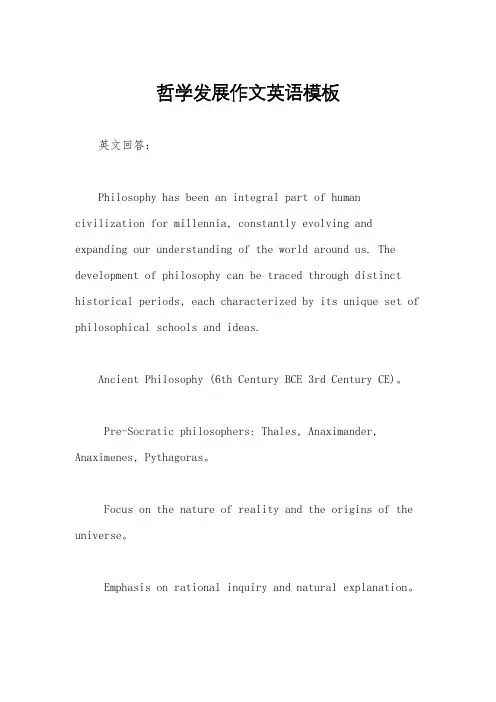
哲学发展作文英语模板英文回答:Philosophy has been an integral part of human civilization for millennia, constantly evolving and expanding our understanding of the world around us. The development of philosophy can be traced through distinct historical periods, each characterized by its unique set of philosophical schools and ideas.Ancient Philosophy (6th Century BCE 3rd Century CE)。
Pre-Socratic philosophers: Thales, Anaximander, Anaximenes, Pythagoras。
Focus on the nature of reality and the origins of the universe。
Emphasis on rational inquiry and natural explanation。
Classical Greek Philosophy (5th 4th Century BCE)。
Socrates: Known for the Socratic method of questioning and emphasis on self-knowledge。
Plato: Developed the theory of Forms, which posits the existence of a realm of perfect and unchanging ideas。
Aristotle: A prolific philosopher who wrote extensively on logic, ethics, metaphysics, and politics。
哲学翻译词汇整理一.哲学家名称Acient Greek philosopherspythagoras n。
毕达哥拉斯(古希腊哲学家和数学家) Socrates n。
苏格拉底(古希腊哲学家)Plato 柏拉图Aristotles 亚里斯多德Leucippus流西普斯Democritus 德谟克利特Epicurus 伊壁鸠鲁(公元前341—270)Italian philosophersPetrarch彼特拉克(意)(1304~1374)Bruno (Giordano) (意)布鲁诺(1548年-1600)Galileo伽利略(意)(1564~1642)(Niccolo) Machiavelli马基雅维里(意)(1469—1527)Polish philosophersCopernicus哥白尼(波兰)(1473~1543)German philosophersKant:康德(德)Nietzsche n。
尼采(德,1844-1900)(Ludwig) Feuerbach 费尔巴哈(Arthur) Schopenhauer 叔本华Hegel: 黑格尔,Hegelian,黑格尔的The Young Hegelians 青年黑格尔学派Marx 马克思Engels 恩格斯English and Scottish philosophersFrancis Bacon 培根(英)(1561—1626)John Locke 洛克(英)Thomas Hobbes托马斯。
霍布斯(英)Adam Smith 亚当.斯密斯(苏格兰)David Hume 休谟(苏格兰)Thomas Malthus托马斯.马尔萨斯Isaac Newton艾萨克。
牛顿(Bertrand)Russell 罗素Ricardo 李嘉图French Philosophers(Rene) Descartes笛卡尔(法)Cartesian adj.笛卡尔的(Baruch)Spinoza 斯宾诺莎(法)(Denis)Diderot 狄德罗(法)(Charles)Montesquieu 孟德斯鸠(法)(1689年至1755年),(Francois) Voltaire 弗朗索瓦伏尔泰(法)(1694—1778),(Jean-Jacques)Rousseau 卢梭(法)(1712-1778)Claude-Henri Saint-Simon 克劳德.圣西门(1760年至1825年)Francois Charles Fourier弗朗索瓦.查尔斯。
哲学专业英语(the course of philosophical English)西方哲学专业词汇Western philosophy西方哲学Ancient Greek-Roman philosophy古希腊罗马哲学Hellenistic philosophy希腊化哲学Medieval philosophy中世纪哲学Renaissance philosophy文艺复兴哲学Modern western philosophy西方近代哲学Contemporary western philosophy西方现代哲学Jewish philosophy犹太哲学马克思主义哲学Philosophy of Marxism中国哲学Chinese Philosophy外国哲学Foreign Philosophy逻辑学Logic伦理学Ethics美学Aesthetics宗教学Science of Religion科学技术哲学Philosophy of Science and Technology 艺术哲学Philosophy of artMetaphysics形而上学Epistemology认识论/知识论Methodology方法论ontology本体论Cosmology宇宙论/宇宙生成论Theory of value/axiology价值论Monism一元论Dualism二元论Pluralism多元论Cognosciblism可知论Agnosticism不可知论Materialism唯物主义Irrationalism非理性主义abstract/concrete抽象/具体Idealism唯心主义Objective /Subjective idealism客/主观唯心主义Scepticism怀疑主义Substance实体macrocosm大宇宙microcosm小宇宙Sensibility/understanding/ reason感性/知性/理性Theism有神论Antitheism 无神论Deism自然神论pantheism泛神论Dialectical materialism辩证唯物主义Historical materialism历史唯物主义Law of identity同一律Law of contradiction排中律Law of excluded middle排中律teleology目的论mechanism机械论dialectics辩证法consciousness意识spirit精神belief信念nature自然reality现实,实在possibility可能性Illusion幻想imagination想象力Mysticism神秘主义Spiritualism唯灵论form形式existence存在appearance现象essence本质prime matter原初质料motion运动Continuity/non-Continuity连续性/间断性time and space时间与空间Past-present-future过去/现在/未来cause and effect原因与结果subject and object主体与客体occasionalism偶因论Ockham’s razor奥康剃刀subjectivity主体性Necessity and contingency必然性与偶然性Universals and individuals个别与一般/共相与殊相/普遍与个别relative and absolute相对与绝对intuition直觉idea观念thought思维perception知觉subsistence潜在knowledge知识opinion意见Nature自然Actuality/reality现实Reality实在Necessity and freedom必然与自由Beginning/first principle/arche(希)本原,始基archetype原型illusion幻象image形像,影像ideology意识形态doctrine of correspondence符合说mind-body problem身心问题representative theory of idea表象说finite and infinite有限与无限humanism人道主义,人文主义Natural theology自然神学substratum基质The infinite/boundless/apeiron无定/无限pneuma普纽玛being存在non-being非存在logos逻各斯mind/nous努斯psyche/pneuma普纽玛atom原子void虚空element元素four roots四根self-knowledge自知Becoming/decay生成/衰亡bisection两分法flying arrow is at rest飞矢不动stadium运动场becoming生成doctrine of effluence流射说Eristic/elenchus论辩术,诡辩术art of midwifery/maieutic method助产术/接生术irony讥讽Virtue is knowledge美德即知识world of idea理念世界Infinite regress argument无穷后退证明Simile of the cave洞穴喻Simile of the line线段喻Simile of the sun太阳喻sense world感性世界,感官世界harmony和谐theory of Participation(sharing)分有说theory of Imitation模仿说copy摹本archetype模型,原型paradigm范式model of universal宇宙模型,世界模型soul of universal宇宙灵魂,世界灵魂Philosopher-king哲学王passion激情Wisdom/courage/temperance/justice智慧/勇敢/节制/正义(four cardinal virtue四主德)Desire/passion欲望/激情artificer工匠,创造者Genus种primary/secondary substance第一、二实体form and matter形式与质料accident偶性potentiality and actuality潜能与现实four causes 四因material cause质料因formal cause形式因efficient cause动力因final cause目的因ether以太Actuality现实/entelechy隐德莱希(完全实现)Good/highest good善/至善Category范畴Peripatetics漫步学派active reason/active intellect主动理性/主动理智mean中道,中庸wisdom智慧Practical wisdom实践智慧intellectual virtue理智德性the liar说谎者argument of the measure of grain谷堆论证argument of the baldhead秃头论证argument of the veiled figure隐藏者论证logos of the universe宇宙理性one太一What-it-is 是什么the third man argument第三者论证Theory of recollection回忆说epoche悬搁判断==judgement of suspensionataraxy静观doctrine of emanation流溢说anthropomorphism神人同形同性论=拟人观pythagoreanism毕达哥拉斯主义transmigration of souls灵魂轮回转世说atomism原子论Mode of cyclical reasoning循环论证Good being nature善即自然sensation was due to action between the unlikes异类相知说doctrine of like knows like同类相知说doctrine of seeds种子说Doctrine of love and strife爱恨说doctrine of image影像说cynicism犬儒主义platonism柏拉图主义theory of idea理念论doctrine of the communion of genera通种论aristotelianism亚里士多德主义syllogism三段论Unmoved mover不动的动者==prime mover purification净化说induction归纳法pyrrhonism皮浪主义Epicureanism伊壁鸠鲁主义canonic准则学Ionian school伊奥尼亚学派Milesian school米利都学派Ephsian school爱菲斯学派Heraclitean school赫拉克利特学派Pythagoreans 毕达哥拉斯学派Eleatic school爱利亚学派privation缺失,匮乏Presocratics前苏格拉底学派Cynics犬儒学派Cyrenaics昔兰尼学派megarian school麦加拉派sophists智者Minor socratics小苏格拉底学派academy学园/柏拉图学园/雅典学园academics学园派peripatetics漫步学派stoics画廊学派/斯多亚学派Epicurean school伊壁鸠鲁学派Christianity基督教Christian philosophy基督教哲学Judaism犹太教Trinity三位一体heresy异端Polytheism多神论eschatology末世论Church fathers教父Providence天意,天命Kingdom of God上帝之国theology神学negative theology否定神学Positive theology肯定神学Patristic philosophy/ Patristics教父哲学/教父学scholasticism经院哲学revealed religion天启宗教,启示宗教Trinity三位一体incarnation道成肉身faith/hope/love信仰/希望/热爱doctrine of redemption救赎论grace神恩,神惠,恩宠omnipotence全能omniscience全知omnipresence全在Argument a posteriori先天证明Argument a priori后天证明fideism信仰主义(僧侣主义)hylozoism物活论Original sin 原罪Justification by faith因信称义Ockham’s razor奥卡姆剃刀nominalism唯名论(extreme/moderate)realism唯实论(extreme/moderate )Augustinism奥古斯丁主义ontological argument本体论证明cosmological argument宇宙论证明teleological argument目的论证明Moral argument道德论证明Supreme good argument至善性证明Faith hope and charity信望爱doctrine of double-truth双重真理论Divine illumination神的光照Theological fatalism神学预定论Thomism托马斯主义Averroism阿威洛伊主义Scotism司各脱主义Rationalism唯理论(materialistic/idealistic )Empiricism经验论(materialistic/idealistic)Social contract theory社会契约论Geographical determinism地理环境决定论Classical German philosophy德国古典哲学Apriorism先天论The reformation宗教改革运动Enlightenment启蒙运动French materialism法国唯物主义Encyclopaedists百科全书派conceptualism概念论Mechanistic materialism机械唯物论learned ignorance有学问的无知maximum极大minimum极小utopia乌托邦universal intellect普遍理智idols假相,偶像theory of four idols四假相说idols of the tribe种族假相idols of the cave洞穴假相idols of the market-place市场假相idols of the theatre剧场假相property and form性质与形式extension广延first principle第一原理Real/nominal essence实在/名义本质blank tablet白板causality因果性causation因果关系cause原因/effect结果experience经验dogma教条Material/Spiritual substance物质/精神实体thinking substance思想实体,思维实体Innate idea天赋观念adventitious ideas外来观念factitious ideas虚幻观念dualism of mind and matter心物二元论Animal sprits精气,元精,动物精神psycho-physical interactionism身心交感论pineal gland松果腺extensive substance广延实体the theory of social contrast社会契约论Association of idea观念的联结(休谟)Cartesianists笛卡儿主义者theory of substance实体论theory of attribute属性论theory of mode样式论(finite/infinite)psycho-physical parallelism心物平行论true idea真观念attribute属性Spinozism斯宾诺莎主义experience经验(external/internal)sensation and reflection感觉与反省abstraction抽象作用abstract idea抽象观念Simple/complex idea简单/复杂观念Immaterialism非物质主义personal identity人格同一性contiguity接近性(休谟)Divine right of kings君权神授说school of continental Rationalism大陆理性派British empirists英国经验派Cambridge platonism 剑桥柏拉图主义Scottish school of common sense苏格兰常识学派Old Hegelians老年黑格尔派Young Hegelians青年黑格尔派Right Hegelians黑格尔右派Left Hegelians黑格尔左派Speculative philosophy 思辨哲学Three tables三表法Table of essence/presence本质表/具有表Table of absence of proximity接近中的缺乏表Table of degree/comparison程度表/比较表Relative/finite substance相对的或有限的实体Absolute/infinite substance绝对的或无限的实体Theory of corpuscles 微粒说Theory of vortex 漩涡说Cartesianism笛卡儿主义cosmotheism宇宙神论(斯宾诺莎)Infinite attribute无限的属性Theory of modes样态论Mode 样态,样式Sensation/reflection感觉/反省External/internal experience外部/内部经验Abstraction抽象作用Psychic force心力(莱布尼兹)Small perception微知觉Principle of continuity连续性原则Idea of substance/modes/relations实体/情状/关系观念real/fantastical ideas实在/幻想观念Intuitive/demonstratic/probable直觉/证明/或然知识primary/secondary/third quality第一/二/三性质real/nominal essence实在/名义本质innate human right天赋人权will of all全体意志monad单子monadology单子论cognition认知Complete notion完满性观念(莱布尼兹)Best of all possible world可能世界中的最佳者sentiment情感——sentimentalismscience of human nature人性科学human nature/humanity人性Per-established harmony前定和谐pre-established harmony预定和谐truth of reason/fact理性真理与事实真理Divine reason 神圣理性theodicy神正论Order of possible coexistence and order of possibilities which cannot coexist可共存之物的秩序与不可共存之物的秩序existence is to be perceived存在就是被感知immaterialism非物质论idea and notion观念与意念impression and ideas印象与观念resemblance类似关系contiguity in time and space接近关系causal relation因果关系determinism of geographical environment地理环境决定论Theory of the omnipotence of education教育万能论Apodictic/assertoric必然的/实然的(康德)Appearance现象(康德)manifold杂多Physico-theological argument自然神论证明critical philosophy批判哲学dogmatism独断论copernican revolution哥白尼的革命pure reason纯粹理性antinomy二律背反thing-in-itself自在之物,物自体appearance现象practical reason实践理性good will善良意志schein幻相moral law道德律finality apart from an end无目的的合目的性Analytic-synthetic分析-综合Sensibility/understanding/reason感性/知性/理性category范畴command律令reflective judgement反思的判断力representation表象Schema图型/schematism图型论,图式论Metaphysical deduction形而上学演绎Metaphysical exposition形而上学阐明Metaphysics of morals道德性而上学Metaphysics of nature自然形而上学transcendental apperception先验统觉Analogies of experience经验的类推architectonic建筑术Autonomy自主性(康德)transcendental idealism先验唯心主义Kantianism康德主义transcendental先验的transcendent超验的transcendental aesthetic先验感性论transcendental analytic先验分析论Transcendental deduction先验演绎Transcendental dialectic先验辩证论Transcendental illusion先验幻象Transcendental logic先验逻辑Transcendental ideal先验的理想Transcendental paralogism先验谬误推理Transcendental reflection先验反思A priori and synthetic judgement 先天综合判断taste鉴赏力Thing-for-itself为我之物A priori先天A posteriori后天A priori judgement先天判断A posteriori judgement 后天判断analytic judgement分析判断synthetical judgement综合判断Quantity of judgement/ category of Quantity判断的量与量的范畴Qualitaty of judgement/ category of Qualitaty判断的质与质的范畴Relation of judgement/ category of relation判断的关系与关系的范畴Mode of judgement/ category of mode 判断的样式与样式的范畴Anthropology 人本学Absolute religion绝对宗教Free spirit自由精神Objective spirit客观精神practical spirit实践精神theoretical spirit理论精神Subjective spirit主观精神Externalization外化objectification对象化Position肯定Negation否定sublation扬弃identical philosophy同一哲学in itself自我for itself自为absolute idea绝对理念absolute spirit 绝对精神philosophy of mind精神哲学subjective/objective spirit主/客观精神these-antithese-synthese正-反-合civil society市民社会alienation异化dialectic辩证法actuality现实Hegelianism黑格尔主义Young Hegellians 青年黑格尔派Natural theology自然神学(理性神学)absolute ego (费希特的)绝对自我animatism 物活论animism 泛灵论,万物有灵论anthropologism 人本主义the Apostles十二使徒asceticism 禁欲主义atomism 原子论,原子学说atonement 赎罪baptism (基督教)洗礼bourgeoisie 资产阶级causationism 因果论Christianity 基督教clherentism 贯通论The Decalogue摩西十戒deism 理神论;自然神论;自然神论(natural religion)Judgment Day 上帝的最后审判日,世界的末日Kant’s nebular hypothesis 康德的星云假说method of exclusion 排除法method of induction 归纳法nativism 先天论,天赋论sense perception 感性知觉sentience 感觉现象;原始感觉theory of reflection 反映论theory of relativity 相对论theory of representation 表象论On nature《论自然》Purification《净化篇》Sophists《智者篇》Phaedo《斐多篇》Parmenides《巴门尼德篇》Republic《国家篇》On the nature of things《物性论》Meditations《沉思集》Bible《圣经》The Apocalypse/Revelations《圣经》中的《启示录》Genesis (《圣经》)(《创世纪》)New-Testament 《新约全书》Confessions《忏悔录》Utopia《乌托邦》New organon《新工具》Advancement of learning《学术的进展》Human nature《论人性》Leviathan《利维坦》Two treatises of civil government《政府论》An essay concerning human understanding《人类理解论》A treatise concerning the principles of human knowledge《人类知识原理》A treatise of human nature《人性论》An inquiry concerning human understanding 《人类理智研究》Dialogues concerning natural religion《自然宗教对话录》The natural history of religion 《宗教的自然史》Enquiries concerning the principles of morals《道德原理研究》Discourse on method《方法谈》Meditations on first philosophy《第一哲学沉思集》The principles of philosophy《哲学原理》Apology for learned ignorance《论有学问的无知》The principles of Descartes philosophy《笛卡尔哲学原理》Organon《工具论》Enneades《九章集》The ethics《伦理学》New essays on human understanding《人类理智新论》City of god 《上帝之城》Theological-political treatise《神学政治论》Essay on theodicy《神正论》On the improvement of understanding《知性改进论》Critique of pure reason《纯粹理性批判》Critique of practical reason 《实践理性批判》Critique of judgement《判断力批判》。